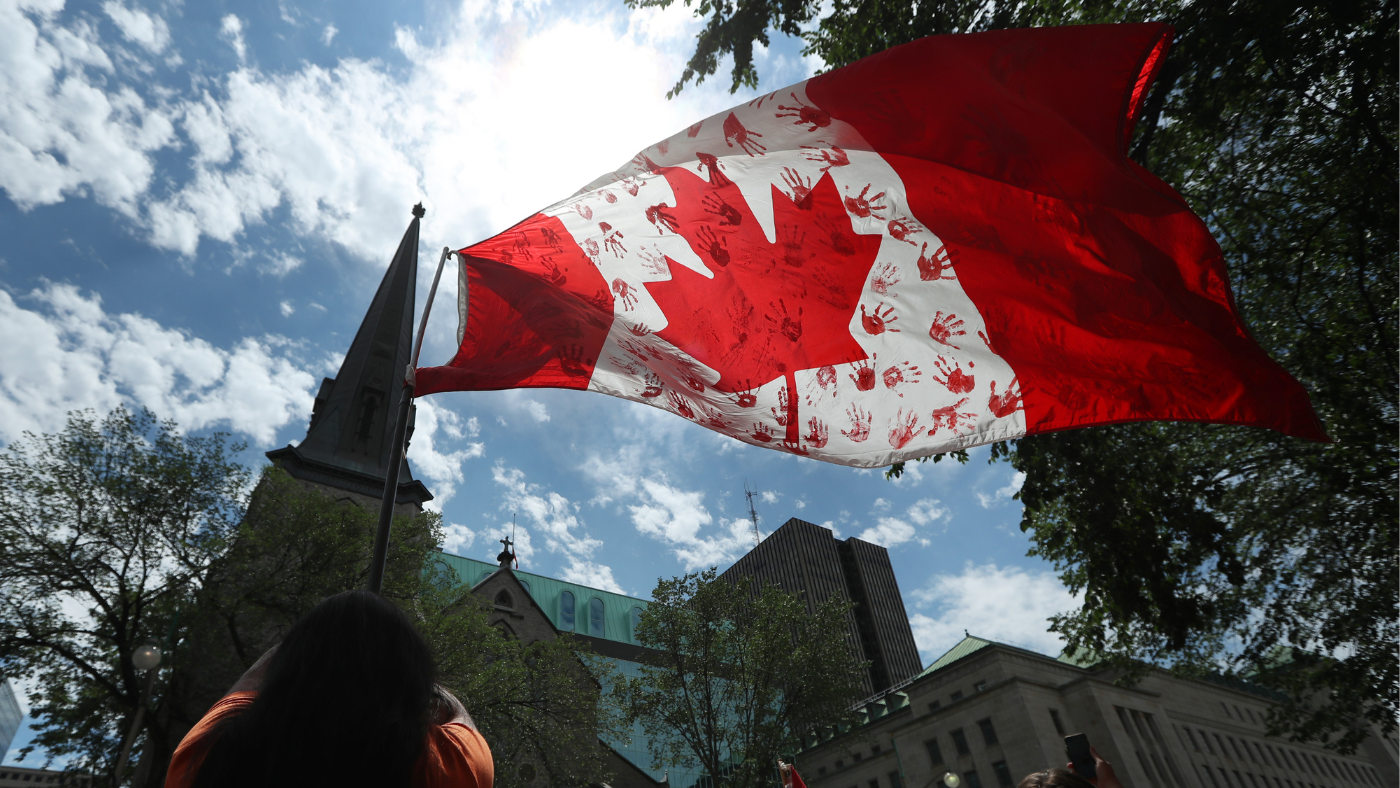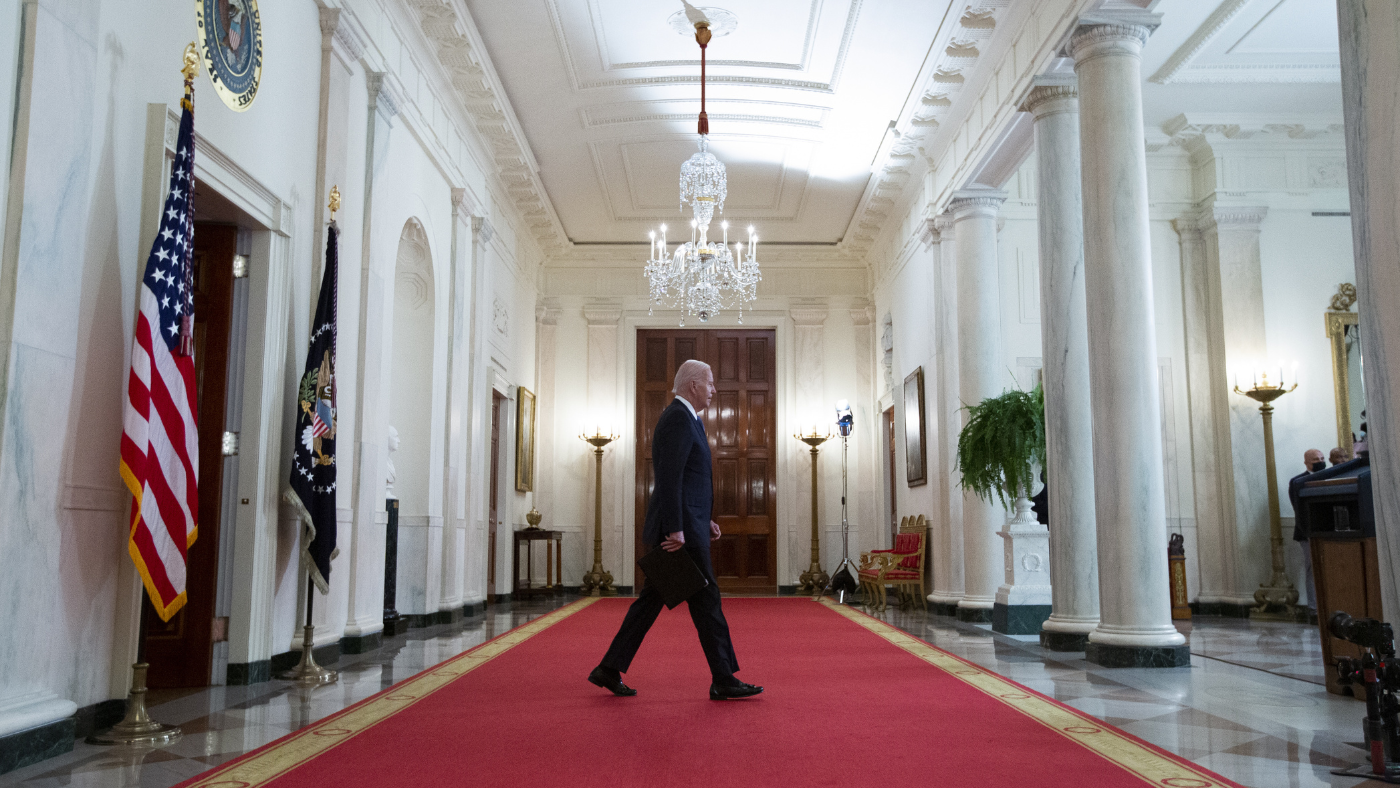‘The idea that the government will focus on our long-term prosperity feels absurdly naive’
Your digest of analysis from the British and international press

- 1. Sadly, our economy isn’t booming after all
- 2. Islamophobia isn’t just a Tory problem – it runs right through British society
- 3. Joe Rogan is far from the most controversial act on Spotify
- 4. A toxic Tory civil war is brewing – and it threatens to leave the party in ruins
- 5. Are you a Wordle ‘hater’? There’s a psychological reason for that
A free daily email with the biggest news stories of the day – and the best features from TheWeek.com
You are now subscribed
Your newsletter sign-up was successful
1. Sadly, our economy isn’t booming after all
Emma Duncan in The Times
on massaged maths
Emma Duncan has taken a look at Boris Johnson’s claim that Britain’s economy is the fastest growing in the G7 and she isn’t impressed. His claim is true “if you look at 12 months of the most recently available data”, but it is also “hardly surprising”, says the columnist. “Having shrunk more than any economy except Japan’s in the early stages of the pandemic, ours had more ground to make up.” In other words, “the greater the height from which you drop a ball, the higher the bounce”. If you look at the pandemic as a whole we have “nothing to boast about”. The Economist ranked our economy’s pandemic record 22nd out of 23 countries “measured by growth, debt, household income, share prices and investment”. “You can massage the figures a bit by picking the right measure”, but “however much you polish the figures, it’s a struggle to make our long-term economic performance shine”. And given Johnson’s plethora of problems, she adds, “the idea that the government might focus on our long-term prosperity, rather than parties, wallpaper and its short-term survival, feels almost absurdly naive”.
The Week
Escape your echo chamber. Get the facts behind the news, plus analysis from multiple perspectives.

Sign up for The Week's Free Newsletters
From our morning news briefing to a weekly Good News Newsletter, get the best of The Week delivered directly to your inbox.
From our morning news briefing to a weekly Good News Newsletter, get the best of The Week delivered directly to your inbox.
2. Islamophobia isn’t just a Tory problem – it runs right through British society
Owen Jones in The Guardian
on endemic bigotry
After a failed London mayoral campaign against Sadiq Khan that was “accused of being riddled with Islamophobia”, Zac Goldsmith was “elevated to the House of Lords and made a minister”, says Owen Jones in The Guardian. Nadine Dorries, who has retweeted “far-right criminal Tommy Robinson”, was also added to the cabinet. Jones reminds us that a YouGov poll found that six out of ten Tory members believe Islam “is generally a threat to western civilisation”. When it comes to Labour, he points out that “29% of its Muslim members report suffering Islamophobia in the party, over a third have witnessed it, and 44% didn’t believe the party took it seriously”. “Anti-Muslim racism is endemic in British society”, in the press and the public, he says. And this is partly because “British Muslims – half of whom live in the poorest 10% communities – lack power and an organised voice”. “Like all forms of bigotry, it’s the voices of the victims that need to be heard the loudest”, but “that doesn’t mean non-Muslims shouldn’t speak out”, he adds. “The failure to do so is what makes anti-Muslim hate mainstream, and that is why to say nothing is to be complicit.”
A free daily email with the biggest news stories of the day – and the best features from TheWeek.com
3. Joe Rogan is far from the most controversial act on Spotify
Will Dunn in the New Statesman
on platform problems
Spotify has removed Neil Young’s music from its service after the artist said that he did not want to share a platform with the podcaster Joe Rogan, whom he accused of “spreading fake information against vaccines”. But The New Statesman’s Will Dunn says the singer-songwriter could have “picked plenty of other targets on the platform”. Steven Crowder, who has been accused of racism, homophobia and harassment, is a “much more controversial host than Rogan”, he writes. Spotify also distributes the podcasts of the “white nationalist” Greg Johnson and “the British far-right group Hearts of Oak”. It also features “divisive broadcasts” by the former Ukip candidate Carl Benjamin, “whose hate speech has caused him to be suspended or banned from other platforms”. “Views on vaccine hesitancy (often described as ‘medical freedom’) are easily found on Spotify,” he says, along with “climate change denial”. While “in traditional broadcasting the platform publishes a small amount of material to a large audience, taking responsibility for its quality”, the platform economy publishes “a vast amount of material”. “There are almost three million podcasts on Spotify – and the market for attention decides who wins.”
4. A toxic Tory civil war is brewing – and it threatens to leave the party in ruins
Fraser Nelson in The Telegraph
on fury and faultlines
The “poisonous allegations” being levelled at the Tory party are “but a taster” of the “fury” that would follow the fall of Boris Johnson, says Fraser Nelson in The Telegraph. The Spectator editor sees serious trouble on the horizon for the Conservative Party, noting that “we have a recipe for multi-dimensional Tory wars: high spenders vs the frugal, Scots vs English, Northerners vs Southerners, Brexit radicals vs incrementalists, free traders vs protectionists”. In further bad news for the Tories, Nelson says these wars will likely be fought “with a toolkit of dirty tricks”. The two most likely candidates in any party leadership election – Rishi Sunak and Liz Truss – are at odds over taxation and there are also serious party divisions over a raft of other issues, including Brexit and Scotland. There are also internal faultlines between northern and southern MPs over spending. Meanwhile, “some of Johnson’s allies are saying that his enemies can forget about any smooth transition” because “he’d hang on to the last, maximising the agony, then there would probably have to be a snap election”. Therefore, while “Après moi, le deluge” is “hardly the most optimistic message to keep his party together”, it might be the best Johnson has.
5. Are you a Wordle ‘hater’? There’s a psychological reason for that
Pragya Agarwal in The Independent
on a backlash to joy
“If you have not come across Wordle yet, we cannot be friends”, writes Pragya Agarwal in The Independent. But there is a growing backlash against the online letters game, which challenges players to find a five-letter word in six guesses, the behavioural and data scientist says. “Why would anyone hate something that is free and not been monetised for capitalist gains, and something that is a simple game only bringing respite in such bleak times”? she asks. The answer, she argues, is that it “is inevitable that some people will hate things that become popular. There is always cynicism and a certain snobbishness associated with anything that becomes part of popular culture.” She adds that when Wordle fans started “having conversations, sharing scores and joy”, it annoyed those who “consider these things to be frivolous, or believe intrinsically that we do not deserve any joy right now”. Agarwal concludes that it is “sad” that “even something as comforting and joyful as a free online game” can be used to create divisions.
-
 The problem with diagnosing profound autism
The problem with diagnosing profound autismThe Explainer Experts are reconsidering the idea of autism as a spectrum, which could impact diagnoses and policy making for the condition
-
 What to know before filing your own taxes for the first time
What to know before filing your own taxes for the first timethe explainer Tackle this financial milestone with confidence
-
 The biggest box office flops of the 21st century
The biggest box office flops of the 21st centuryin depth Unnecessary remakes and turgid, expensive CGI-fests highlight this list of these most notorious box-office losers
-
 Triangle-headed aliens touched Goldie Hawn
Triangle-headed aliens touched Goldie HawnTall Tales And other stories from the stranger side of life
-
 Boris Johnson shocks UK by resigning from Parliament
Boris Johnson shocks UK by resigning from ParliamentSpeed Read
-
 Bees delay flight for three hours
Bees delay flight for three hoursfeature And other stories from the stranger side of life
-
 ‘The UK’s malaise will not end with the Prime Minister’s exit’
‘The UK’s malaise will not end with the Prime Minister’s exit’Instant Opinion Your digest of analysis from the British and international press
-
 ‘Police tactics are not getting worse, they are simply being filmed’
‘Police tactics are not getting worse, they are simply being filmed’Instant Opinion Your digest of analysis from the British and international press
-
 ‘G7 leaders missed a golden opportunity’
‘G7 leaders missed a golden opportunity’Instant Opinion Your digest of analysis from the British and international press
-
 ‘It takes some soul searching to celebrate Canada Day’
‘It takes some soul searching to celebrate Canada Day’Instant Opinion Your digest of analysis from the British and international press
-
 ‘Breakthrough on abortion rights could be there if Biden reaches for it’
‘Breakthrough on abortion rights could be there if Biden reaches for it’Instant Opinion Your digest of analysis from the British and international press